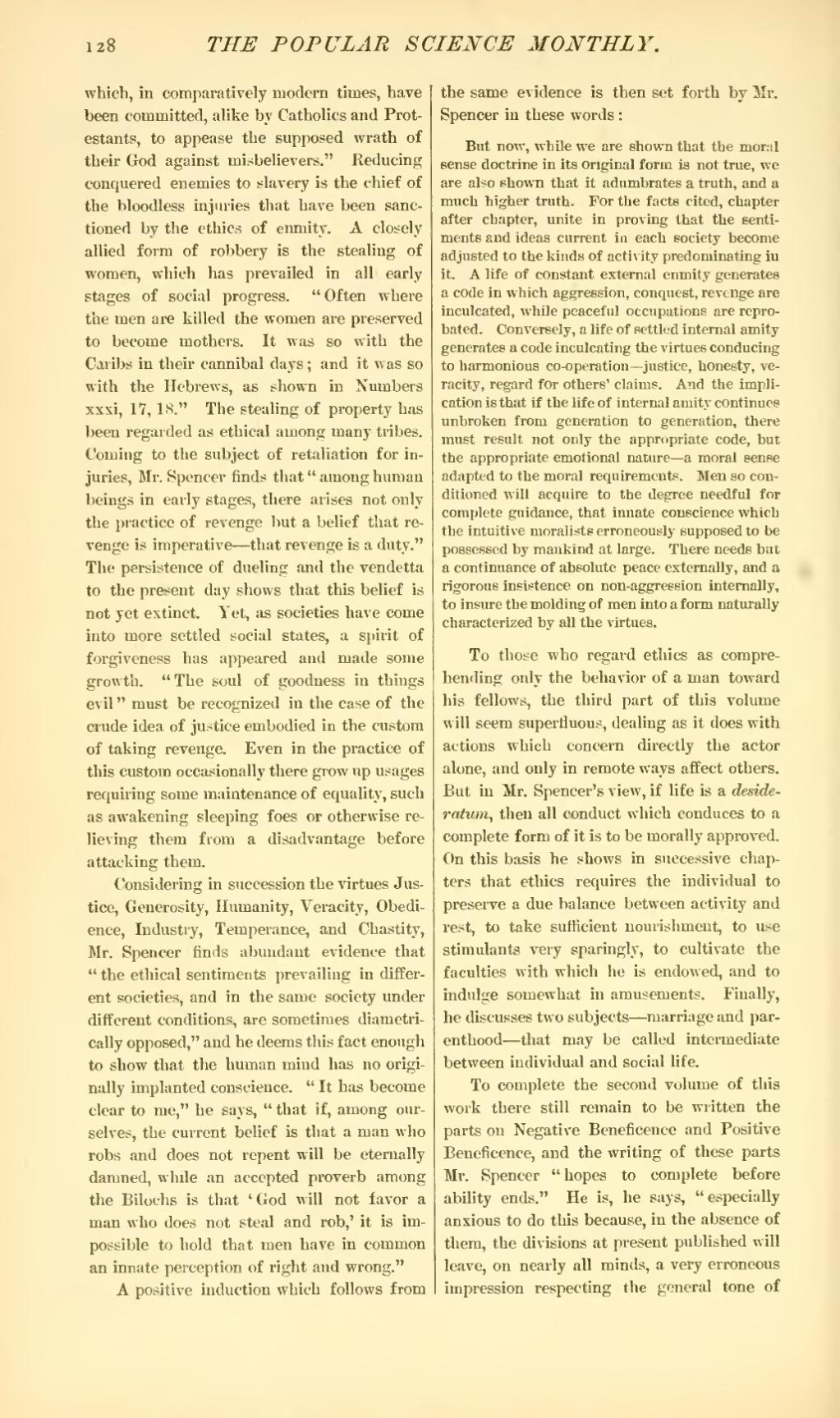which, in comparatively modern times, have been committed, alike by Catholics and Protestants, to appease the supposed wrath of their God against misbelievers." Reducing conquered enemies to slavery is the chief of the bloodless injuries that have been sanctioned by the ethics of enmity. A closely allied form of robbery is the stealing of women, which has prevailed in all early stages of social progress. "Often where the men are killed the women are preserved to become mothers. It was so with the Caribs in their cannibal days; and it was so with the Hebrews, as shown in Numbers xxxi, 17, I8." The stealing of property has been regarded as ethical among many tribes. Coming to the subject of retaliation for injuries, Mr. Spencer finds that "among human beings in early stages, there arises not only the practice of revenge but a belief that revenge is imperative—that revenge is a duty." The persistence of dueling and the vendetta to the present day shows that this belief is not yet extinct. Yet, as societies have come into more settled social states, a spirit of forgiveness has appeared and made some growth. "The soul of goodness in things evil" must be recognized in the case of the crude idea of justice embodied in the custom of taking revenge. Even in the practice of this custom occasionally there grow up usages requiring some maintenance of equality, such as awakening sleeping foes or otherwise relieving them from a disadvantage before attacking them.
Considering in succession the virtues Justice, Generosity, Humanity, Veracity, Obedience, Industry, Temperance, and Chastity, Mr. Spencer finds abundant evidence that "the ethical sentiments prevailing in different societies, and in the same society under different conditions, are sometimes diametrically opposed," and he deems this fact enough to show that the human mind has no originally implanted conscience. "It has become clear to me," he says, "that if, among ourselves, the current belief is that a man who robs and does not repent will be eternally damned, while an accepted proverb among the Bilochs is that 'God will not favor a man who does not steal and rob,' it is impossible to hold that men have in common an innate perception of right and wrong."
A positive induction which follows from the same evidence is then set forth by Mr. Spencer in these words:
To those who regard ethics as comprehending only the behavior of a man toward his fellows, the third part of this volume will seem superfluous, dealing as it does with actions which concern directly the actor alone, and only in remote ways affect others. But in Mr. Spencer's view, if life is a desideratum, then all conduct which conduces to a complete form of it is to be morally approved. On this basis he shows in successive chapters that ethics requires the individual to preserve a due balance between activity and rest, to take sufficient nourishment, to use stimulants very sparingly, to cultivate the faculties with which he is endowed, and to indulge somewhat in amusements. Finally, he discusses two subjects—marriage and parenthood—that may be called intermediate between individual and social life.
To complete the second volume of this work there still remain to be written the parts on Negative Beneficence and Positive Beneficence, and the writing of these parts Mr. Spencer "hopes to complete before ability ends." He is, he says, "especially anxious to do this because, in the absence of them, the divisions at present published will leave, on nearly all minds, a very erroneous impression respecting the general tone of

